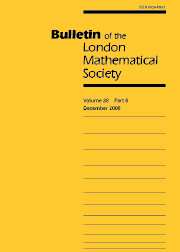Article contents
SOLUBILITY OF SYSTEMS OF QUADRATIC FORMS
Published online by Cambridge University Press: 01 July 1997
Abstract
It has been known since the last century that a single quadratic form in at least five variables has a nontrivial zero in any p-adic field, but the analogous question for systems of quadratic forms remains unanswered. It is plausible that the number of variables required for solubility of a system of quadratic forms simply is proportional to the number of forms; however, the best result to date, from an elementary argument of Leep [6], is that the number of variables needed is at most a quadratic function of the number of forms. The purpose of this paper is to show how these elementary arguments can be used, in a certain class of fields including the p-adic fields, to refine the upper bound for the number of variables needed to guarantee solubility of systems of quadratic forms. This result partially addresses Problem 6 of Lewis' survey article [7] on Diophantine problems.
- Type
- Research Article
- Information
- Copyright
- © The London Mathematical Society 1997
- 4
- Cited by


